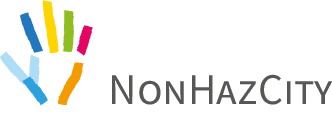On April 14th – 15th, 2021 the NonHazCity consortium organises a virtual seminar called “Hazardous Substances in Plastics – knowledge and behavior change”. This seminar marks the start of the “Plastic Diet” campaign
Plastic is a vector for hazardous substances. The synthetically produced material consists of linear and branched molecular chains and is usually mixed with cocktails of additives. The additives may guarantee the desired functions of our everyday items, such as a high flexibility (softeners), UV protection (UV protectors) or the slowing down of flame propagation (flame retardants). The problem: additives and also residues from plastic production processes can leach out and can cause very negative effects on humans health and the environment. We have learned so far about plastic wastes on land, in oceans and dophine bellies, about macro- and microplastic particles. This knowledge about hazardous substances in plastic materials and articles has not yet reached most of people (end-users).
Hence, the current debate on plastic waste must be carried out in line with the issue of its containing hazardous substances!
For solving the plastic issue, regulating or banning the use of single-used plastics is an important step forward, but it is not enough. Indeed, the implementation of circular systems and economy is strongly required to solve the plastic crises and that can only be worked out with non-toxic solutions set as default.
We are inviting you to an international seminar to discuss the plastic crises with a strong emphasis on hazardous substances, and also in connection with climate change, current consumption patterns and other global challenges. We would like to give to plastic campaigners new knowledge on hazardous susbtances.
We also want to discuss the gap between the knowledge and actual behaviour change regarding the use of plastic and, as well to think new awareness raising campaigns that push circular thinking and non-toxic solutions stronger into the spotlight of private and professional decision makers.
Seminar contents:
- Knowledge about plastic as a vector of hazardous substances – what substances are we talking about and why?
- Making the invisible visible – how to embed the issue of hazardous substances into current plastic awareness raising campaigns to encourage behaviour change
- The plastic issue does not stand alone – highlighting interconnections of the plastic problem with climate change and other global challenges
- Kick-off of the “NonHazCity plastic diet” – a Social Media Campaign to start on 3rd May (more information here).
DOWNLOAD PRESENTATIONS HERE:

